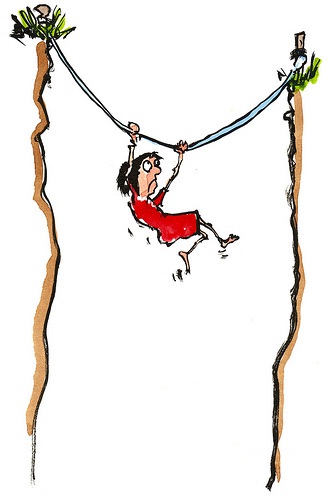
A Tale of Woe or a Tale of Whine?
 On August 25th, Kiara Davenport posted on her blog a horrible story she had been the victim of.
On August 25th, Kiara Davenport posted on her blog a horrible story she had been the victim of.
In it, she claimed that after securing a publishing contract with a one of the Big6 publishers, and cashing in a partial advance of $20K, they terminated the contract and required her to refund the partial advance in order to get her book back.
The reason for that termination, still according to Davenport, is that she self-published other work of hers and the publisher claims it is a breach of contract though the newly published work has nothing to do with the book due to be published by the publisher.
She claims they saw her putting her work on Amazon as threatening for their industry and that their reaction reflects “the publisher’s fear and loathing of the profoundly threatening Goliath, Amazon.”
On the face of it, it appears that the big bad publisher is being mean for no reason and using his muscles to force his will onto an innocent and well meaning writer who had done nothing wrong.
Yet, at no point does Davenport quote the terms of the contract, so, other than her assurance that her agent stands behind her, we have to take it on faith that she did not indeed breach her contract.
Amusingly, in a letter she wrote to Joe Konrath after signing the publishing deal, she complained about the miserly advance offered by the unnamed publisher. Asides from moaning abundantly about her finances and the hard time, also states that the miserly advance from the unnamed publisher would be paid on in fourth throughout 2013, the contract dating back to January 2010, and the horror story to August 2011, we might conclude that she already received half of the advance, making the advance worth $40K to $80K, depending on when she received first instalment, a sum definitely not miserly but that she had been “coerced into giving up more than 75% of the profits from electronic sales” in order to accept that pitance.
Note that it still means 25% royalties on e-sales. Considering the benefits in distribution and marketing provided by the Big6, 25% royalties on e-sales are probably worth much more than 40% from a new online publisher as is increasingly the rule (see List of Rated ePublishers), and factoring in the time needed for marketing etc, possibly as much or more than the 70% given by Amazon, as is K.L. Brady‘s opinion.
Davenport also claimed that her previous 3 novels were selling well, but that their sales had dropped, because of the recession, leaving her contemplating suicide rather that scrounging to make ends meet, the only reason she accepted the unnamed publisher miserly offer.
Looking at her page on Amazon, it appears that her self-published books indeed fare better than those previously published by traditional publishers. No doubt that is due to her marketing efforts. Marketing efforts that either had not been used to promote her preciously published boos during the recession or were deemed too demanding on the royalties front. This is not said.
Since the publisher remains unnamed, it is impossible to get his side of the story, but, as a writer, Davenport certainly impersonates a rather whiny character.
On some forums, the question as to whether this story was actually real or just a ply to garner attention – hence sales – has even been raised, that is apart from a general agreement that her qualification of the advance is an insult to all the aspiring writers out there who would jump at the opportunity but have no other option than self-publish.